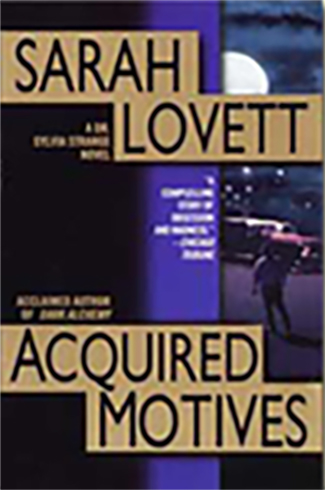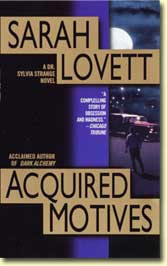Anthony Randall didn’t look like a self-confessed sadistic rapist. His large blue eyes were free of guile, his cheeks were tinged pink, his lips habitually worked themselves into a soft frown. He looked younger than his twenty-two years…
…he looked like an altar boy. .
Sylvia Strange shifted in the hardwood chair where she had been poised for more than thirty minutes. The glare of the fluorescent lights made her head ache. Her navy silk skirt was creased. She hoped dark circles of perspiration weren’t visible under the arms of her suit jacket. It was her job to maintain the illusion of control even when the courtroom resembled the inside of a pressure cooker.
Sylvia noticed sweat easing down Judge Nathaniel Howzer’s throat to the collar of his black robes. The judge had summoned opposing counsel to the bench three times during the past fifteen minutes. Clearly, he wasn’t pleased with the most recent turn of events.
Just days earlier, Erin Tulley, an officer with the New Mexico State Police, had admitted that Anthony Randall had been reeling under the effects of drugs and alcohol when he confessed to rape. The law demanded that confessions be knowing and voluntary–tricky when the confessor’s system was toxic.
Immediately following Tulley’s turnaround, the defense had filed a motion to suppress the confession. If granted, there would be no trial, and the defendant would walk. The judge had refused to render a decision on the motion until he heard the testimony of the evaluating forensic psychologist: Sylvia Strange.
As Judge Howzer conferred yet again with defense and prosecuting attorneys, the bailiff fanned himself with both hands. It had to be pushing ninety degrees in the courtroom. A female journalist in the gallery lifted a ponytail of graying hair above her neck and strained forward to catch the breeze from a portable fan. The nose and mouth of another reporter were covered with a white mask to filter out environmental impurities.
Behind the press row, the family members of the rape victim were huddled together. The victim’s mother looked as if she was shell-shocked. Sylvia could hardly bear to glance at the woman.
Judge Howzer finished his murmured consultation with the attorneys. Sylvia took a deep breath to regain her focus as Tony Klavin, the defendant’s attorney approached the witness stand. Klavin was thirty-five, athletic, and aggressive; he committed every ounce of energy to this examination.
“Dr. Strange, at any time during the fifteen hours you spent with the defendant Anthony Randall, did you discuss his family history?”
Sylvia saw Randall seated at the defense table, his blond head held perfectly still. She said, “During the examining interview I obtained a clinical history to establish the individuality of the defendant’s background, his family, education. and life experiences.”
Tony Klavin nodded sagely and the dark curl that licked his forehead bounced ever so gently. He’d earned a reputation as a cunning and oily defense attorney by taking on offensive clients and winning their high-profile cases. He jammed both hands into his pants pockets and hunkered down. “Did Anthony Randall have a tragic childhood?”
“Objection.” The prosecutor, Jack O’Dell, was on his feet. He shook his head in disgust. “Dr. Strange has not been qualified by this court as a dramaturge, Your Honor.”
“Mr. Klavin, rephrase the question in less theatrical language.”
Tony Klavin touched the tips of his fingers together; his hands formed a triangle. “Dr. Strange, did Anthony Randall become a substance abuser when her was eleven years old?”
For a split second she locked eyes with the defendant; it was like looking into the eyes of something dead. Six weeks ago, during the final clinical interview at the jail, Randall had been cocky, convinced that his ability to manipulate would get him whatever the hell he wanted. He wasn’t sophisticated enough to be cognizant of the MMPI-2 validity scales, which detected “fake bad” crazies–those hard-core cases who wanted the world to think they were too sick to take responsibility for their crimes. But he had a good handle on his sociopathic skills: deceit, control, exploitation.
“A skilled, if chilling, novel…strong on suspense.”
Her name notwithstanding, Sylvia Strange is a fairly normal forensic psychologist; here, as in her debut (Dangerous Attachments), it is the world around her that is strange and disturbingly violent. After Sylvia’s court testimony helps let sadistic rapist Anthony Randall go free, both she and the defendant pay. Randall is abducted, castrated and torched, and Sylvia is attacked and left a photo of the castrated rapist. Sylvia’s lover, Matt England, on the murder case for the New Mexico State Police, is wary of a friend, AWOL FBI agent Dan Chaney, who crops up to convince Sylvia and Matt that the killer is an arms dealer the Bureau claims is dead. By the time a second sexual offender is torched, and it looks like Sylvia may have contributed to the death by overlooking problems with a client during his parole-mandated therapy sessions, Chaney’s story sounds pretty good. Toss in Matt’s ex-lover, a shaman with “a midnight full-moon healing ceremony” and a psychic who helps save the day, and this becomes a story for those who revel in excess: physical, psychological and spiritual. The path to the solution is convoluted and character-crowded, but Lovett successfully pulls the story’s several strands together in the end.




